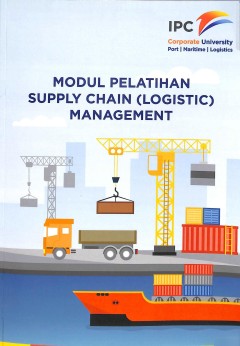Ditapis dengan

Modul Pelatihan : Supply Chain (Logistic) Management
This module is an introductory to Supply Chain Management, anad part of module of FIATA Higher Diploma in Supply Chain Management
- Edisi
- -
- ISBN/ISSN
- -
- Deskripsi Fisik
- 92 p., 29.5 cm.
- Judul Seri
- -
- No. Panggil
- IPC GUI SUP s

The impact of RFID utilization and supply chain information sharing on supply…
The purpose of this research is to remove barriers hindering radio frequency identification (RFID) adoption/diffusion in industries, and help firms develop effective supply chain management (SCM) practices utilizing RFID, by elucidating the specific mechanisms through which RFID influences supply chain performance (SCP). On the basis of the technology-organization-environment framework, this re…
- Edisi
- Vol. 18, 1, 78–100
- ISBN/ISSN
- 1479-2931
- Deskripsi Fisik
- 23 p.
- Judul Seri
- Maritime Economics & Logistics
- No. Panggil
- ATC LO KIM t

Understanding supply chain management concepts in the context of port logisti…
In academia as in practice, seaports are increasingly viewed as elements in supply chains. It is argued that seaports should add value to shippers by aligning their own business activities with shippers’ Supply Chain Management (SCM) strategies and requirements. The implications of this ‘port-SCM’ philosophy are not fully explored, however. In this context, it is especially important to c…
- Edisi
- 2014 Volume 29(4): 376–385
- ISBN/ISSN
- 1648-3480
- Deskripsi Fisik
- 11 p.
- Judul Seri
- Transport
- No. Panggil
- ATC LO HER u

Key success factor analysis for e-SCM project implementation and a case study…
The semiconductor market exceeded US$250 billion worldwide in 2010 and has had a double-digit compound annual growth rate (CAGR) in the last 20 years. As it is located far upstream of the electronic product market, the semiconductor industry has suffered severely from the “bullwhip” effect. Therefore, effective e-based supply chain management (e-SCM) has become imperative for the efficient …
- Edisi
- Vol. 43 No. 8, 2013 pp. 657-683
- ISBN/ISSN
- -
- Deskripsi Fisik
- 29 p.
- Judul Seri
- International Journal of Physical Distribution & Logistics Management
- No. Panggil
- ATC LO PIN k

Key success factor analysis for e-SCM project implementation and a case study…
The semiconductor market exceeded US$250 billion worldwide in 2010 and has had a double-digit compound annual growth rate (CAGR) in the last 20 years. As it is located far upstream of the electronic product market, the semiconductor industry has suffered severely from the “bullwhip” effect. Therefore, effective e-based supply chain management (e-SCM) has become imperative for the efficient …
- Edisi
- Vol. 43 No. 8, 2013 pp. 657-683
- ISBN/ISSN
- -
- Deskripsi Fisik
- 29 p.
- Judul Seri
- International Journal of Physical Distribution & Logistics Management
- No. Panggil
- ATC LO NIN k

Green supply chain practices and company performance: the case of 3PLs in Italy
The pressure on logistics companies to embrace green processes has increased significantly in the last few years. Within the broad concept of green supply chain management, a review of the existing literature has highlighted a need to understand how green supply chain practices (GSCP) can contribute to improving company performance from an environmental point of view, as well as economic and op…
- Edisi
- Vol. 42 No. 7, 2012 pp. 640-672
- ISBN/ISSN
- -
- Deskripsi Fisik
- 36 p.
- Judul Seri
- International Journal of Physical Distribution & Logistics Management
- No. Panggil
- ATC LO MIC g

Horizontal logistics collaboration for enhanced supply chain performance: an …
The paper aims to develop a supply chain-driven model horizontal logistics collaboration (HLC). HLC initiatives can fail. To improve the chance of success, a thorough consideration of the potential issues involved, such as seeking supply chain partners’ support, ensuring access to information/data security and assessing whether an HLC model could bring improvements to a wide range of supply c…
- Edisi
- Volume 20 · Number 6 · 2015 · 631–647
- ISBN/ISSN
- -
- Deskripsi Fisik
- 18 p.
- Judul Seri
- Supply Chain Management: An International Journal
- No. Panggil
- ATC LO HAR h

Lessons on knowledge creation in supply chain management
The purpose of this study is to convey lessons learned from a long-term research project and present a coherent approach for researching relevant areas, ranging from ontology to quality.
- Edisi
- Vol. 27 No. 4, 2015 pp. 346-368
- ISBN/ISSN
- -
- Deskripsi Fisik
- 25 p.
- Judul Seri
- European Business Review
- No. Panggil
- ATC LO ERI l
 Karya Umum
Karya Umum  Filsafat
Filsafat  Agama
Agama  Ilmu-ilmu Sosial
Ilmu-ilmu Sosial  Bahasa
Bahasa  Ilmu-ilmu Murni
Ilmu-ilmu Murni  Ilmu-ilmu Terapan
Ilmu-ilmu Terapan  Kesenian, Hiburan, dan Olahraga
Kesenian, Hiburan, dan Olahraga  Kesusastraan
Kesusastraan  Geografi dan Sejarah
Geografi dan Sejarah